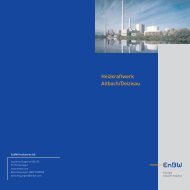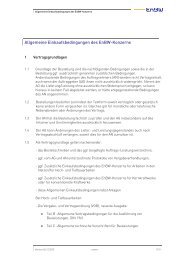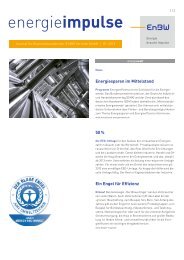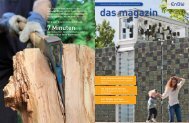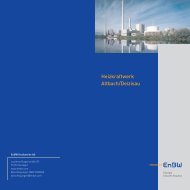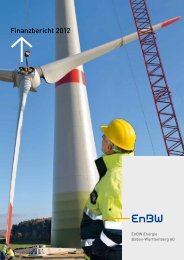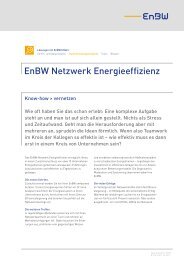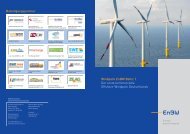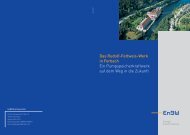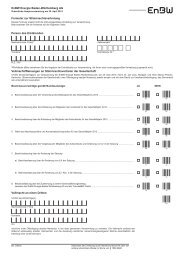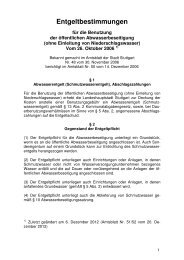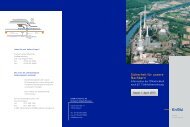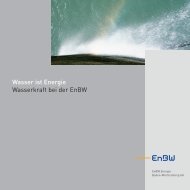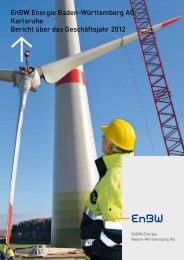2008 I 2009 Sustainability Report - Econsense
2008 I 2009 Sustainability Report - Econsense
2008 I 2009 Sustainability Report - Econsense
You also want an ePaper? Increase the reach of your titles
YUMPU automatically turns print PDFs into web optimized ePapers that Google loves.
Stuttgart – a model region<br />
for "electromobility"<br />
As part of the German government's "Economic<br />
Stimulus Package II", Stuttgart was<br />
chosen as a model region for electromobility<br />
together with 7 other regions. The focus is on<br />
the testing and timely market launch of electric<br />
vehicles. The key themes of the Stuttgart<br />
project, which is scheduled to run until 2011,<br />
are intermodal mobility and public awareness.<br />
Mobility is only sustainable if it can be<br />
provided cost-efficiently, is environmentfriendly<br />
and suitable for widespread use.<br />
Various measures are being taken within the<br />
framework of the project to ensure that as<br />
many people as possible profit from "electromobility".<br />
They include the provision of a<br />
large number of the different available vehicle<br />
types, a wide range of charging options<br />
within the city boundaries and a common<br />
communication portal.<br />
EnBW will make a total of 500 electrically<br />
driven two-wheelers (so-called "e-scooters")<br />
from different manufacturers available to<br />
the local people. A further 200 e-rollers are<br />
to be used in municipal mobility projects<br />
within the model region. All in all, 700 intelligent<br />
charging points are planned for the<br />
project and will be located on public roads,<br />
in multi-storey carparks and parking lots as<br />
well as on company premises and in private<br />
areas. The charging points, most of which are<br />
produced by project partner Bosch, will be<br />
technically equipped by EnBW and installed<br />
in a close-knit network.<br />
In order to set the public mood for this innovative<br />
topic as early as possible, EnBW will<br />
launch an "advance trial" comprising the<br />
first 50 scooters and 20 charging stations.<br />
These test scooters will be equipped to serve<br />
as "labs on wheels", providing insights into<br />
the mobility habits of users during the trial<br />
phase.<br />
The charging pumps will be installed at underground<br />
stations, "Call a Bike" points or<br />
railway stations. At these central e-hubs, people<br />
will be able to "fill up" not just cars but also<br />
e-scooters and pedelecs (electrically driven<br />
bicycles). These network hubs will be a key<br />
element in the spread of electromobility.<br />
A further module in the system is the development<br />
and testing of an "intermodal e-mobility<br />
portal", via which interested parties<br />
and users can obtain information on all issues<br />
relating to electro-mobility.<br />
Today, with the "Model Region Stuttgart" and<br />
the related "MeRegio" and "MeRegioMobil"<br />
sister projects, EnBW is already taking the<br />
first targeted steps on the road to sustainable<br />
mobility.<br />
Microalgae for CO 2-fixation<br />
Reducing CO 2 emissions is one way of containing<br />
global warming. Another option is<br />
to store CO 2 that has already been produced<br />
or to bind it using plants. In March <strong>2008</strong>,<br />
EnBW and Subitec GmbH in Stuttgart<br />
launched a multi-year project to investigate<br />
the potential for the fixation of CO 2 from<br />
flue gases using microalgae. Around 1.8 kg<br />
of CO 2 are bound in 1 kg of microalgae.<br />
Moreover, microalgae can produce up to<br />
ten times the area-based yield of conventional<br />
terrestrial plants.<br />
Algae growth is being researched in highperformance<br />
new-generation algae bioreactors<br />
developed by Subitec in cooperation<br />
with the Fraunhofer Institute for Interfacial<br />
Engineering and Biotechnology in Stuttgart.<br />
The pilot facility in Eutingen im Gäu in the<br />
Freudenstadt district processes the CO 2<br />
from a unit-type heat-and-power plant used<br />
in an agricultural biogas plant. The aim of<br />
EnBW is to investigate the energy profile<br />
and economic efficiency of algae production<br />
in order to determine the feasibility of<br />
the method for the fixation of CO 2 from<br />
power plants.<br />
The produced algae biomass is in great demand<br />
in industry for the extraction of basic<br />
substances used in cosmetics, pharmaceuticals<br />
and foodstuffs. The remaining biomass<br />
can be used to generate energy or as animal<br />
feed. The wide range of potential applications<br />
means that algae production could<br />
well be a financially lucrative activity – particularly<br />
in view of the fact that it does not<br />
take up any of the farmland needed for food<br />
production.<br />
Moreover, the project won an award in the<br />
<strong>2009</strong> "Germany – Land of Ideas" competition<br />
organised by the German government.<br />
29



